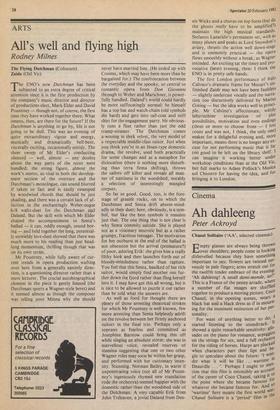ARTS
All's well and flying high
Rodney Milnes
The ENO's new Dutchman has been subjected to an extra degree of critical attention since it is the first production by the company's music director and director of productions elect, Mark Elder and David Pountney — though not, of course, the first time they have worked together there. What omens, then, are there for the future? If the Dutchman is anything to go by, life is not going to be dull. This was an evening of quite extraordinary vigour and energy, musically and dramatically hell-bent, viscerally exciting, occasionally untidy. The sheer sweep of Mr Elder's conducting silenced — well, almost — any doubts about the way parts of the score were handled; the string figure, almost the work's motto, so vital in both the develop- ment section of the overture and the Dutchman's monologue, can sound blurred if taken so fast and is easily swamped by woodwind chords that should be just shading, and there was a certain lack of af- fection in the enchantingly Weber-esque 6/8 waltz-duet for the Dutchman and Daland. But the skill with which Mr Elder shaped the accompaniment to Senta's ballad — it can, oddly enough, sound bor- ing — and held together the long, potential- ly unwieldy love-duet showed that there was much more to his reading than just head- long momentum, thrilling though that was on its own terms.
Mr Pountney, while fully aware of cur- rent trends in opera production wafting over here from a generally easterly direc- tion, is a questioning director rather than a mere lecturer. The crucial autobiographical element in the piece is gently limned (the Dutchman sports a Wagner-style beret) and it seemed almost as though the composer was telling poor Minna why she should never have married him. (He ended up with Cosima, which may have been more than he bargained for.) The confrontation between the everyday and the spooky, so central to romantic opera from Don Giovanni through to Weber and Marschner, is power- fully handled. Daland's world could hardly be more suffocatingly normal: he himself has a top hat and watch-chain (old symbols die hard) and gets into tail-coat and stiff shirt for the engagement party. He obvious- ly runs a fleet rather than just the odd tramp-steamer. The Dutchman comes a-wooing in sleek velvet, the very model of a respectable middle-class suitor. Just when you think you're in an Ibsen-type domestic drama, the revolve, used both practically for scene changes and as a metaphor for dislocation (there is nothing more disturb- ing than terra firma shifting), throws the sailors off kilter and reveals all man- ner of nastiness in the woodshed, notably a selection of interestingly mangled corpses.
So far so good. Good, too, is the fore- stage of granit-e rocks, on to which the Dutchman and Senta drift absent-mind- edly in their duet; here, obviously, is a sym- bol, but like the best symbols it remains just that. The one thing that is not clear is why Senta commits suicide. She is played not as a visionary neurotic but as a rather grumpy, fractious teenager. The motivation for her outburst at the end of the ballad is not obsession but the arrival (premature?) of poor, adoring Erik: she gives him a really filthy look and then launches forth out of bloody-mindedness rather than rapture. You feel that this Senta, baulked of her rich suitor, would simply find another one fur- ther down the fjord rather than fling herself into it. I may have got this all wrong, but it is nice to be allowed to puzzle it out rather than be told what the answers are.
As well as food for thought there are plenty of those arresting theatrical strokes for which Mr Pountney is well known, few more arresting than Senta helplessly adrift on the revolve between her firmly anchored suitors in the final trio. Perhaps only a soprano as fearless and committed as Josephine Barstow could bring this off while singing an absolute storm: she was in marvellous voice, revealed reserves of stamina suggesting that one or two other Wagner roles may soon be within her grasp, and performed with her customary inten- sity. Stunning. Norman Bailey, in warm if unpenetrating voice (not all of Mr Pount- ney's ingeniously rhymed new translation rode the orchestra) seemed happier with the domestic rather than the woodshed side of the Dutchman. A very capable Erik from John Treleaven, a jovial Daland from Den- ms Wicks and a chorus on top form (but do the ghosts really have to be amplified?) maintain the high musical standards. Stefanos Lazaridis's permanent set, with as many planes and peaks as Lord Snowdon's aviary, thrusts the action well down-stage and is eminently practical — the opera flows smoothly without a break, as Wagner intended. An exciting (at the time) and pro- vocative (later) evening, then: I think the ENO is in pretty safe hands.
The first London performance of Rai() Calvino's dramatic frame for Mozart's un- finished Zaide may not have been faultless — slightly undercast vocally and the narra- tion too discursively delivered by Marius Goring — but the idea works well in princi- ple. Mr Calvino's affectionate, wittilY labyrinthine investigation of Plot possibilities, motivation and even endings (three or more to choose from — I lost count and was not, I think, the only one) makes for a delightful evening and, more important, means there is no longer any ex- cuse for not performing music that is far too good to be left on the library shelf. I can imagine it working better under workshop conditions than at the Old Vic, but full marks to Adam Pollock's Musica nel Chiostro for having the idea, and for bringing it to London.






































 Previous page
Previous page